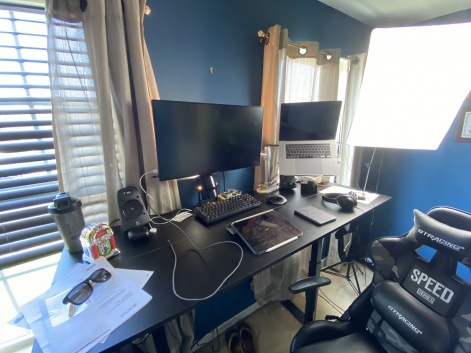The games industry plays host to a colourful cast of diverse individuals, from artists and coders to narrative designers and studio heads.
The skills to pull off these roles, however, are complex and differing, with each position requiring mastery in its field – especially in these complex times we are all living through at the minute.
To highlight some of the brilliant work that goes on behind the scenes as well as how employees around the world are adapting to the life of remote work, PocketGamer.biz is reaching out to the individuals who make up the games industry in our Jobs in Games: Remote Working series.
This week we spoke with Yodo1 AI team leader Christopher Dossman.
PocketGamer.biz: Can you tell us about your current role and what it entails?
Christopher Dossman: I’m leading Haidra (named after the mythological beast), an interdisciplinary team focused on the application of AI, data science, and automation to solve pain points our game developer partners face.
One of the fields in which we apply AI is game monetisation. An example of this is by providing tailored IAP (In-App Purchase) and IAA (In-App Advertising) recommendations to game developers. We also help our partners better monetise their games based on the characteristics of their player base through MAS, our ad monetisation platform.
I was lucky enough to get a call out of the blue, but you might need to go knocking on many doors before the right one opens up.Christopher Dossman
Like any other team leader, my responsibilities shift depending on the projects I’m working on and what is needed to move them forward at any given time. I fill a gap wherever there is one, whether that means taking on the role of programmer, data scientist, product manager, marketer, coach, or another role.
How did you first get into games and how did you progress into this role?
I first got into games when I acquired my first computer. My parents had set it up while we were at school and didn’t want us to see it before they got home. Of course, the first thing we do is try to find games. We ended up playing Minesweeper for hours.
After a month of playing Solitaire and all of the other Windows games, we realised that we needed a change, however, we had no internet. A couple of days later my brother created a bootable Linux-cd at the library, with some unique Linux pre-installed games and he taught me how to create my own bootable disks - thus starting my path into computer science and Games.
For a long time, computer science and games were separate pursuits for me. 10 years after I began my journey towards computer science, I found myself in Beijing. One day I received a call from Henry Fong at Yodo1, telling me about their mission to help game developers build scalable businesses using data science and AI. After a couple of meetings, I knew this would be a great opportunity to merge my two interests and help tens of thousands of game developers worldwide.
What did you study (if anything) to get your role? What courses would you advise for aspiring professionals in the area?
In college, I studied electrical engineering with a focus on digital signal processing. This major requires a lot of math and computer science courses, which all helped prepare me for a career in AI and data science. Most technical majors will prepare you for a role in AI so you have a lot of choices.
When it comes to the gaming industry, it’s another story. If you are dedicated and search hard you will be able to find a collection of information that can help partially answer the many questions a game developer will face on their journey. This can often slow down development and suck up weeks of research time. To help make this process easier, Yodo1 recently released a free course that offers an amazing introduction to the 'Business of Mobile Gaming'.
Do you think there are any misconceptions, public or professional, surrounding your area of expertise?
AI is not a magic bullet to all of the unsolved problems that exist in our world. Perhaps general artificial intelligence can be that magic bullet, but the AI that exists in many companies consists of specialised tools to help make search, recognition, recommendation, embedding, and many other specific tasks more effective.
These tools are not what I would call intelligent. They don’t work unless considerable work goes into the design of the feedback loops and user experience around these large expensive systems.
What advice do you have for someone looking for a job in this profession?
The best experience is to go out and do it. Play many video games, see how they monetise, build your own game, build a website, read that book, write that blog post, build momentum around yourself and use it to break into the industry. I was lucky enough to get a call out of the blue, but you might need to go knocking on many doors before the right one opens up.
Imagine teleporting instantly from a crowded, busy office to a secluded mountain retreat or an exciting cityChristopher Dossman
How has the shift from office to remote working impacted your role, if at all?
I spend a lot more time communicating with all of the different teams I work with. Communication is more of a challenge when working remotely because people are not as easy to reach anymore. With our team spread out in all corners of the world it is hard to find a time when we can all meet up.
Although, now that the team habits around remote work have been built up, it is also much easier to onboard the best talent in the world. We are no longer stuck with hiring from the much smaller pool of one city.
What does your typical day look like when working remotely?
Most days start off at 6 am with a morning walk and a strong cup of coffee. By 8 am I’m at my computer starting the day. At around 1 pm, I call it for the morning and make time for some of my hobbies until around 6 pm when I get back into work mode to be available when our China-based colleges start their morning.
Remote work has allowed me to live a better lifestyle than I have had at any other stage of my life. I get to stay at home with my family and enjoy our hobbies in a relaxing environment.
What do you think are the biggest advantages and disadvantages of remote working?
The biggest advantage is that I can turn off distractions completely. Imagine teleporting instantly from a crowded, busy office to a secluded mountain retreat or an exciting city. This is the life that remote work promises. When I close my laptop, the office disappears.
The biggest disadvantage is that you now are more responsible than ever to market your ideas and build a publicly verifiable portfolio of past products. Those with powerful content and portfolios will be able to win in this new remote age.
Is there anything you wish you had known before moving to remote working?
I wish I knew more about the power of recorded video messages. When I first started remote working it was challenging to communicate effectively without the subtle facial and body cues that many of us are used to. I suppose in the future emojis will effectively allow us to communicate similar cues, but we will leave that for the mobile-native generation.

Regardless, when I discovered video messages, it was like discovering radio waves. It opened up a whole new way to connect with co-workers. Ideally used to share three to five-minute clips on specific topics or to give feedback in a more personal way.
Do you have any advice for others who are struggling to adjust to remote work?
I would recommend scheduling blocks of time to work on specific projects or deliverables. I was a mess when I first started working remotely because I had trouble with time management. Now I plan my week ahead of time and learn from how my ideal calendar differed from actual time usage.
After the pandemic ends and if you were given the choice, would you prefer to continue working remotely or go back to working in an office?
I think the future of remote work is going to be hybrid. Recently, I’ve been working on a project to convert a historic American farm in upstate New York into a remote workers’ paradise. At the end of the day, you need a real human connection between colleagues to foster the trust needed in a modern high-performance team.

















